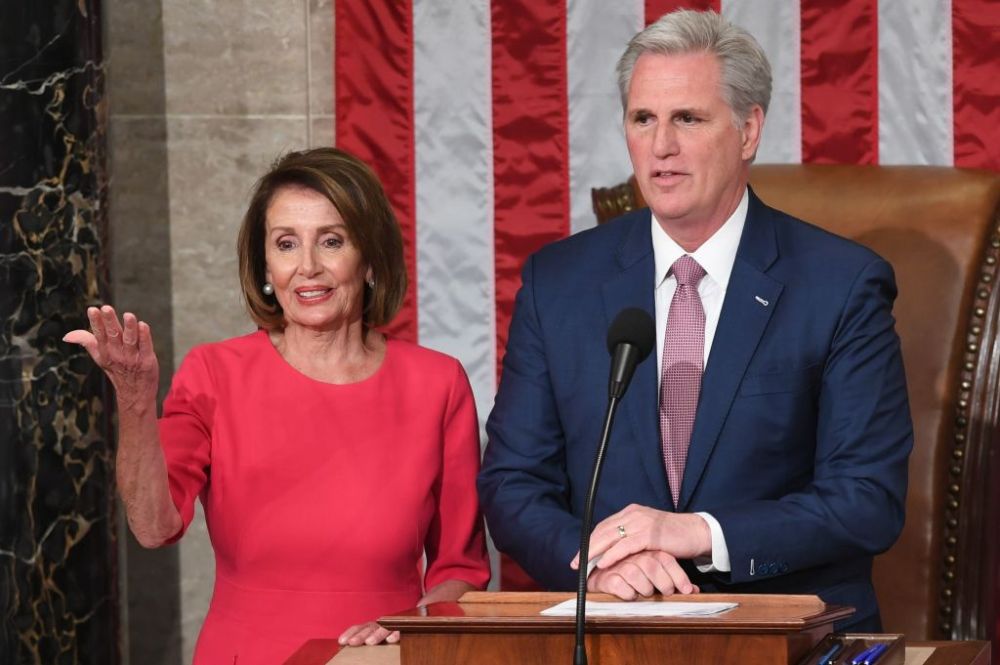There’s a distinct disadvantage to writing an election-day newsletter, especially in a time of profound uncertainty about polling. You might want to write a combination premortem/postmortem about election outcomes that you think are likely, but in the face of repeated polling failures, we’re at the “shame on me” stage of relying on polling to make predictions.
So I’m not going to do that. Instead, I want to ask a different question. Putting aside all the sound and fury and nonsense about “most important election of our lifetimes,” I want to try to ask and answer this question: What will be truly significant about the new Congress?
Note the question. I’m specifically asking about the new Congress, not the next two years of American government. Because of the decades-long decline of Congress’s power and effectiveness, it’s now the most neutered branch of government. The president and the Supreme Court wield immense autonomous power. Congress? Not so much.
So if you’re looking for Congress to impeach Joe Biden and investigate his son Hunter—two actions that are way downstream from most peoples’ lives—then you’ve got lots to look forward to if and when the Republicans retake the House. But if you’re looking for this Congress to fix inflation, to control crime, to reform immigration, or to regulate abortion (the top issues on most voters’ minds), then you’re likely to be sorely disappointed.
Combine congressional impotence with the incredible dearth of truly impressive candidates, and it’s hard to avoid the conclusion that this might actually be one of the least important elections of my lifetime.
There are two foreseeable ways, however, in which this Congress could be truly historic. There are two events that are completely in its control upon which world and American history could hinge. The first is whether it continues to vote for aid to Ukraine, and the second is whether it certifies the outcome of the next election. In both cases there is a low probability of a high-consequence event.
Let’s take Ukraine first. As I wrote recently, Ukrainian military success depends on two factors—Ukrainian valor and American aid. There is no sign that Ukrainian valor is flagging, and for now American commitments remain strong. But if we pull our support, then our western allies simply can’t make up the difference. They don’t have the capacity. We’re the arsenal of democracy. They are not.
Moreover, it’s tough to overemphasize the radiating cost of a Ukrainian collapse triggered by American failure. It would cast American commitments to NATO in doubt, no matter how much we assured allies that we’d remain stalwart in our treaty commitments. Combined with our withdrawal from Afghanistan, it could signal a turning point in world affairs. The post-Cold War Pax Americana would be over. It would be time to prepare for other dictators in other places to test America’s will.
Yet Americans don’t really care. Yes, there is strong support for Ukraine, but it’s low-priority. In a recent Quinnipiac poll, only three percent of respondents listed it as a top issue for the midterms. Moreover, support is softest in the GOP, the party that’s (almost) certain to retake the House and may well retake the Senate. In the same poll, 36 percent of Republicans indicated that America is doing “too much” to support Ukraine while only nine percent of Democrats felt the same way.
The good news is that a majority of Republicans either believe our support is at the right levels (30 percent) or too little (26 percent), but the political momentum is on the side of the “America First” isolationist right. GOP support for Ukraine has decreased, Republican politicians report that the “ground is shifting” on the issue at the grassroots, and key figures in Republican reactionary politics and right-wing infotainment, such as Tucker Carlson and Rep. Marjorie Taylor Greene, are committed to undermining American aid.
I’m always concerned when personal experience starts to match the data, and twice this week I’ve had conversations with stalwart, non-Trumpist Republicans who’ve echoed populist talking points. “People are getting tired,” one person said. “We can’t write a blank check,” said another.
Yet I question whether anyone is actually “tired” of a war we’re not fighting, and as I’ve explained before, American military aid to Ukraine—comparing dollars spent to damage dealt to our enemies—is one of the most cost-effective military allocations in generations. We’re crippling Russian conventional military capability at a fraction of the cost (in lives and dollars) of an actual American military deployment.
The bottom line is sad but true. For the first time in my adult life, if I’m most concerned about defending the west against Russian aggression, then dozens of Democrats are better options than multiple populist Republicans, including at least four members of my own state’s congressional delegation. Mitch McConnell remains stalwart, but if the House fails, America fails.
Whether a Republican-controlled House fails could depend on whether Speaker McCarthy applies the so-called “Hastert Rule” to Ukraine aid bills. The Hastert Rule refers to an informal practice where the Speaker refuses to bring a bill to a vote unless a majority of the majority supports the legislation.
Apply the Hastert Rule to Ukraine aid, and Ukraine could be cut off by a populist minority of the House, if that populist minority can ultimately control the Republican caucus. Remove the Hastert Rule, and Ukraine aid is almost certainly secure, at least until the next presidential election.
There’s even more reason to distrust Republicans on elections. A majority of elected Republicans voted not to certify the 2020 election results, even after the violent attack on the Capitol. These individuals are either delusional (and believed the absurd conspiracies undermining the results) or gutless. When the chips were down, they couldn’t do what the moment demanded.
And make no mistake, the number of election deniers is set to grow in the new Congress. The good news (just as with Ukraine) is that the combination of Democrats and sane Republicans will likely create a firewall against electoral catastrophe, but with the news that Trump is virtually certain to announce another run for president as soon as next Tuesday, we have to take seriously the idea that we might face a repeat of 2020, but with even more MAGA Republicans in the House and the Senate.
Can we possibly count on a Sen. Mehmet Oz, a Sen. Herschel Walker, or a Sen. Blake Masters to hold the line against another attempted Trump coup?
Again, the likelihood of a congressional coup is low, even lower than the likelihood of cutting off Ukraine aid. But the consequences would be catastrophic.
And so I’ll be watching the returns tonight with a sense of resignation tinged with dread. The resignation is based on the near-certainty that the new Congress won’t plant the seeds of an American political renaissance. In fact, if it pours its main energy into performative investigations (though consider me enthusiastically committed to investigating the Afghanistan debacle), then it is more likely to contribute to the slow but steady erosion of the legislative branch.
There will be silver linings to a Republican victory if Democrats truly understand that extremism is the path to electoral ruin and if they rein in their ascendant white progressive activist base. A Republican victory post-Dobbs should send the message to Democrats that basing much of their identity around abortion is both bad policy and bad politics.
A second silver lining will be the ability to say no to the worst Democratic policies and (if Republicans take the Senate) the worst Democratic nominees, which is for many voters the primary point of divided government. It’s not that they have high hopes for Republican legislation, instead they want the legislative gridlock that results.
But the silver linings will be attached to the dark cloud of reactionary Republicans who will enter Washington advocating policies that could do profound harm to American security and American democracy.
If Republicans do take the House, the Senate, or both, then for the fourth time in the last five presidencies, the party in power will have had exactly two years of unified control until the voters restore divided government. That’s not an earthquake. It’s business as usual, and that’s exactly how we should view this election—unless the reactionary right truly takes control.
One more thing …
This is a humiliating moment. Or at least it should have been. The Daily Wire’s Matt Walsh went on Joe Rogan’s podcast and asserted that “millions” of kids have been on hormone blockers. That’s laughably absurd. There has been a spike in students identifying as genderqueer or non-binary, but millions of kids on puberty blockers?
Rogan’s team fact-checked Walsh in real time, and found that the true number of children placed on puberty blockers was less than 1,000 kids per year, out of the more than 70 million children in the United States.
I want to be crystal clear on where I stand. I don’t believe minor children should receive “gender-affirming” surgery or be placed on puberty blockers. States have the constitutional authority to block such treatments, and they should.
At the same time, one of the reasons why our politics has become so hysterical is constant exaggeration. Critical race theory is everywhere! Drag queens are overrunning our schools! Millions of kids are on puberty blockers!
Take something that’s bad (there are, in fact, harmful anti-racist training modules, drag shows for children are absurd, and no child should be given life-altering “gender-affirming” medical treatment) and then hype the threat. Make it pervasive. Frighten people. It’s a formula for ratings and clicks, but it’s also a formula for reactionary politics and constitutional violations. It’s a formula that heightens American polarization and contributes to pervasive anger and despair.
Walsh has cast himself as an expert on these matters. He created a documentary attacking radical gender ideology. He should know better.
One last thing …
Forgive me. This is a video game ad. But it’s hilarious—a family therapy session with Ben Stiller, LeBron James, and John Travolta.







Please note that we at The Dispatch hold ourselves, our work, and our commenters to a higher standard than other places on the internet. We welcome comments that foster genuine debate or discussion—including comments critical of us or our work—but responses that include ad hominem attacks on fellow Dispatch members or are intended to stoke fear and anger may be moderated.
With your membership, you only have the ability to comment on The Morning Dispatch articles. Consider upgrading to join the conversation everywhere.